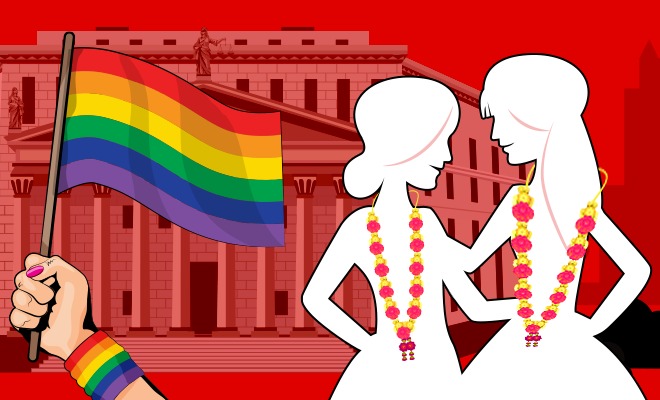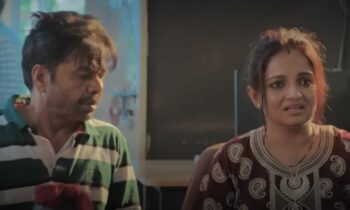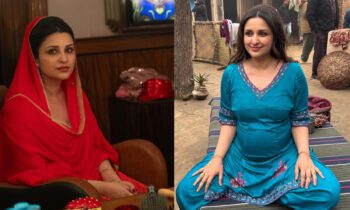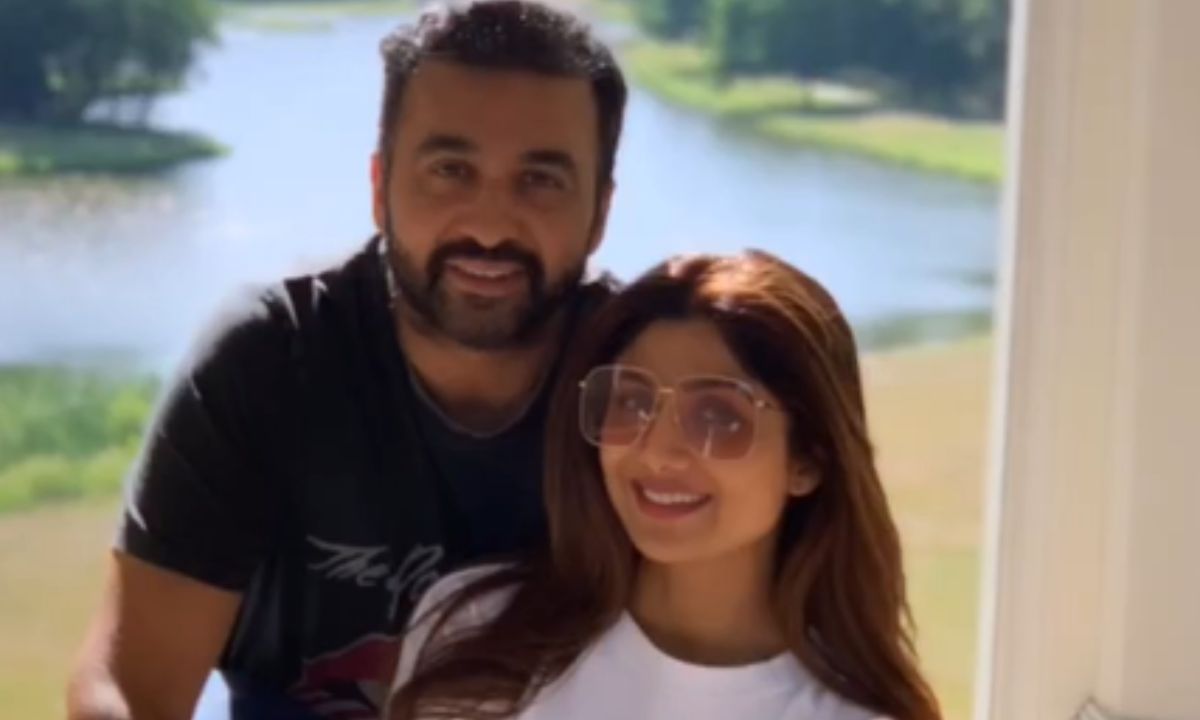Same-Sex Marriages Still Seem A Distant Dream, Courtesy The Hidebound Nature Of Our Judicial System

Right now, as citizens of India, we are in a boat that we all must row in one direction for it to move smoothly. But what is happening instead is that we, progressive ones are trying to move forward, only to be constantly pulled back by those who place traditions over human rights. We are a democracy, apparently. But apart from a voting system—the very basic of being a democracy—there’s barely anything that spells equality here. Today, if you’re a straight, rich man in our country, you’re the king. But if you’re a woman, poor, of a lower caste, or in the LGBTQ+ community, you have not just “heard” but lived through the very violations of our constitution. Years after consensual same-sex relationships were decriminalised, we are still way behind when it comes to same-sex marriages. The recent argument by the Center calling marriage a valid institution only if it is between a man and a woman paddled our boat back to the depths of oppression.
The court said, “Personal laws recognise only heteronormative marriages. Interference in this would cause havoc.” Because havoc in the lives of people inflicting pain on other individuals so they can live peacefully knowing their traditional beliefs aren’t challenged? These people are like the overbearing neighbourhood aunties that don’t want young people in an apartment in their society to live life as per their wish. These are the people that are causing several people in the LGBTQ+ community to suffer depression, lack of self-worth, and have suicidal thoughts. Why? Because they want to control the way others live. So excuse me, Centre, but it’s important to cause havoc in their lives. If we would have been so accommodating, we’d never cause havoc in the lives of the British rulers and still be under their rule.
https://twitter.com/YuktaaThakur/status/1365290108769824770
Demolition of Section 377 was just the tip of the iceberg
The path to this reformation was laden with tribulations and didn’t happen overnight. The journey began with a bang, as in a landmark decision, in which the Supreme Court of India recognised the third gender and gave transgender individuals some relief. Along with that, it was also ruled that transgender individuals would have access to reservations in education and vocation, in order to uplift them from years of oppression.
In July 2009, Delhi High Court observed that “Section 377 denies the dignity of such individuals, criminalises their identity and violates their right to privacy which is protected within the ambit of Article 21 of the Constitution.” This was after Naz Foundation, an NGO took to the court to decriminalise homosexuality.
However, in 2013, the Supreme Court of India reversed it. “But this decision of Delhi High Court was reversed by the Supreme Court in case of Suresh Kumar Kousal and Ors vs. Union of India. Court held that the parliament is having an authority to change the law and not the courts. This decision was criticized by many people as a very conservative approach towards the law,” reports legalserviceindia.com.
Finally, when section 377 got struck down, we rejoiced because at least same-sex couples will have some freedom. We got a step closer.
The next step should be to decriminalise same-sex marriages, especially because same-sex couples still experience discrimination on the grounds of sexuality and aren’t able to enjoy personal liberty.
Can these articles (14/15/21) be applied in scrapping #Section370? Or even reading down #Section377? But, not in establishing #marriageequality? What sort of duplicity is this? What sort of hypocrisy is this? #GayMarriage #LGBTQIA #LGBTIQ #LGBT #MarriageEquality #SameSexMarriage
— THE LGBTQIAN (@AmitOjha2019) February 26, 2021
Same-sex couples and legal rights
“The sphere of privacy allows person to develop human relations without interference from the outside community or from the State. The exercise of autonomy enables an individual to attain fulfillment, grow in self-esteem, build relationships of his or her own choice, and fulfill all legitimate goals that he/she may set. In the Indian Constitution, the right to live with dignity and the right of privacy is recognised as dimensions of Article 21,” reports lawctopus.com.
By not recognizing same-sex marriages, individuals from the LGBTQ+ community cannot enjoy the benefits of a married life and have legal provisions for adoption, property rights, divorce/separation as well as healthcare rights.
“There is no procedure, prescribed for adoption to same sex couple. There are other alternatives like Surrogacy. But the legislation has not prescribed the surrogacy rule to same sex couple under Surrogacy Bill of 2019[31]. There is a real need of such alternative reproduction for same sex couple. And they are quite far from this measures,” explains legalserviceindia.com.
“Now there is a necessity of develop the approach of Sexuality Jurisprudence in India. The change in Law after the decision of the Supreme Court has somehow changed the attitude of people towards the same sex couple, but it has not fully as accepted by society. Further to make this happen, the law needs to be that efficient with respect to Adoption, Alternative Reproductive Resources, Property rights, Divorce, Child Custody to give the real justice to the Judgment of Section 377 of Indian Penal Code which was led down by Supreme Court,” the legal platform further adds.
.@iAmVJAndy on Centre’s statement on #Samesexmarriage: Homosexuality has existed for ages, so why are we behaving as if it is something new and not suiting the fabric of society?
Read: https://t.co/LlYU2beQnn#VJAndy pic.twitter.com/8Bia5R1KxZ
— Delhi Times (@DelhiTimesTweet) February 26, 2021
Law and ‘Log Kya Kahenge’
Dismissing the petition to legalise same-sex marriages, the Centre explained in the affidavit: “Institutions of marriage and the family are important social institutions in India that provide for the security, support and companionship of members of our society and bear an important role in the rearing of children and their mental and psychological upbringing also. It is submitted that the celebration of a marriage gives rise to not just legal but moral and social obligations, particularly the reciprocal duty of support placed upon spouses and their joint responsibility for supporting and raising children born of the marriage and to ensure their proper mental and psychological growth in the most natural way possible.”
Who gives anyone the right to imply that same-sex parents aren’t fit enough to give their children the same mental, emotional opportunities that heteronormative parents do? “Our findings suggested that children with same-sex parents fare well, both in terms of psychological adjustment and prosocial behavior,” reads a study by Prof. Roberto Baiocco, Ph.D., and colleagues of the Sapienza University of Rome. “The study adds to a preponderance of evidence showing no increase in problems for children of gay or lesbian parents, compared to children of heterosexual parents,” reports Science Daily.
There is no scientific evidence to support claims that same-sex couples cannot fulfil the moral and social obligations of a marriage. The problem is that marriages in India are seen not as a personal choice but as a religious, cultural, and moral obligation. Honour killings arise from the same source, except that the discrimination there is on the basis of caste.
Hindus are like – marrying a tree is allowed to decast manglik.
Marrying rapist is okay to get saved from shame
Rape after marrige is perfectly okay in sanskari family system.
But #SameSexMarriage is a sham!
— Varun Maturkar (@MaturkarVarun) February 26, 2021
Same-sex marriages around the world and where India stands
Netherland was the first country that legalised same-sex marriages. Countries like Spain, Canada, Belgium, Norway, Portugal, South Africa, Argentina, Iceland, and Sweden have also followed suit. Some states in the United States have legalised same-sex marriages too. Meanwhile, there are several substitutes in many countries, one of them called the Civil Union.
“With esteem to Indian culture, if we want to adopt a Civil Union Model, it will not only essential to make new enactments but also to amend the certain legislations such as Indian Succession Act, 1925, Guardian and Wards Act, 1890, Workmen Compensation Act, 1923. In many states of the U.S.A., European Countries, Australia and New Zealand have adopted this concept. In Civil Unions they transmit all the benefits and protection just like marriage,” reports legalserviceindia.com.
ALSO READ: Centre Opposes Plea To Recognise Same Sex Marriage, Says Only Husband And Wife Make A Family. This Is Unfair!
“The change in law after the decision of Supreme Court has somehow changed the attitude of people towards the same-sex couple, but it has not fully as accepted by the society. Further to make this happen, the law needs to be that efficient with respect to Adoption, Alternative Reproductive Resources, Property rights, Divorce, Child Custody to give real justice to the Judgment of Section 377 of the Indian Penal Code which was led down by Supreme Court,” adds the website.
So while our judicial system has a more hidebound approach to same-sex laws, how many more years until this change will be made?

















